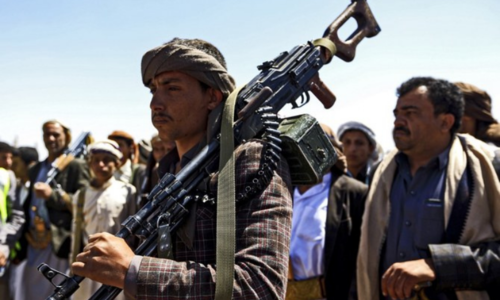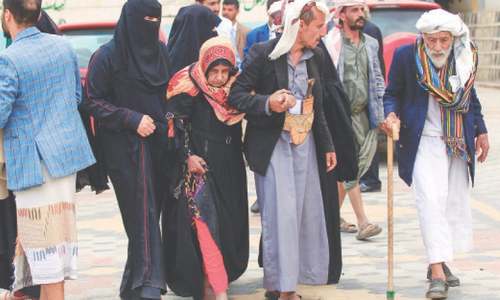DUBAI: Strikes on Yemen’s largest airbase on Sunday killed at least 30 pro-government troops and wounded scores more, medical and loyalist sources said, blaming Iran-backed Houthi rebels for the attack.
The strikes were carried out on Al-Anad airbase, located some 60 kilometres north of Yemen’s second city Aden in the south of the conflict-riven country.
The airbase served as the headquarters for US troops overseeing a long-running drone war against Al Qaeda until they pulled out in March 2015, shortly before the Houthis overran the area.
“More than 30 have been killed and at least 56 were injured” at the military facility in the government-held southern province of Lahij, armed forces spokesman Mohammed al-Naqib said.
He said the Houthi rebels fired missiles and carried out a drone attack at the base.
Yemeni President Abedrabbo Mansour Hadi expressed condolences for the dead and vowed that the “Houthis will pay heavily for all the crimes they have committed against the people of Yemen”, the state news agency Saba reported.
There was no immediate comment from the rebel side.
Video footage from the scene showed dozens of people gathered in front of Lahij hospital, where one ambulance after another was pulling up to drop off casualties.
An official from the hospital said it was all hands on deck. “We have called on the entire staff, surgeons and nurses, to come in,” Mohsen Murshid said.
“We also know that there are still bodies under the rubble.”
Doctors Without Borders (MSF) tweeted that one of its hospitals in Aden received 11 wounded after the attack.
“They were provided with the necessary medical and surgical assistance and they were discharged from the hospital,” MSF said.
Yemen’s internationally recognised government — backed by a Saudi-led military coalition — and the Houthis have been locked in war since 2014, when the insurgents seized the capital Sanaa.
In 2019, the Houthis said they launched a drone strike on Al-Anad during a military parade, with medics and government sources saying that at least six loyalists were killed — including a high-ranking intelligence official.
Eleven people were wounded in that attack, including Yemen’s deputy chief of staff Major General Saleh al-Zandani, who later died of his injuries.
Al-Anad was recaptured by government forces in August 2015 as they recovered territory from the rebels across the south with support from the Saudi-led coalition. Sunday’s incident is one of the deadliest since December, when blasts targeting cabinet members rocked Aden airport.
At the time, at least 26 people, including three members of the International Committee of the Red Cross and a journalist, were killed and scores wounded in the explosions as ministers disembarked from an aircraft in the southern city.
Published in Dawn, August 30th, 2021















































